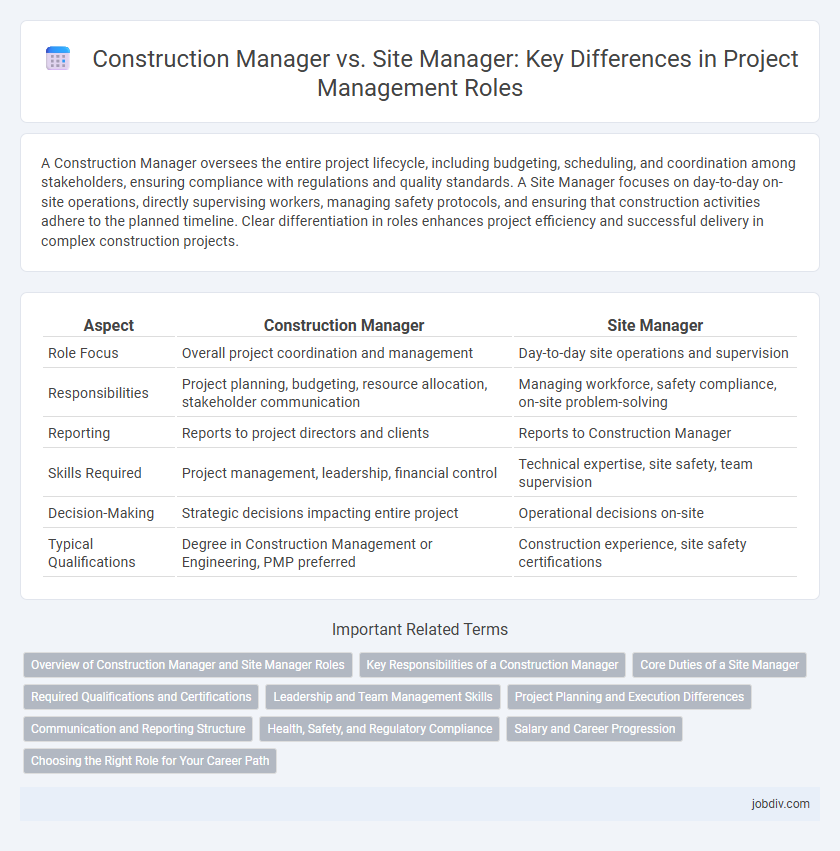A Construction Manager oversees the entire project lifecycle, including budgeting, scheduling, and coordination among stakeholders, ensuring compliance with regulations and quality standards. A Site Manager focuses on day-to-day on-site operations, directly supervising workers, managing safety protocols, and ensuring that construction activities adhere to the planned timeline. Clear differentiation in roles enhances project efficiency and successful delivery in complex construction projects.
Table of Comparison
| Aspect | Construction Manager | Site Manager |
|---|---|---|
| Role Focus | Overall project coordination and management | Day-to-day site operations and supervision |
| Responsibilities | Project planning, budgeting, resource allocation, stakeholder communication | Managing workforce, safety compliance, on-site problem-solving |
| Reporting | Reports to project directors and clients | Reports to Construction Manager |
| Skills Required | Project management, leadership, financial control | Technical expertise, site safety, team supervision |
| Decision-Making | Strategic decisions impacting entire project | Operational decisions on-site |
| Typical Qualifications | Degree in Construction Management or Engineering, PMP preferred | Construction experience, site safety certifications |
Overview of Construction Manager and Site Manager Roles
The Construction Manager oversees the entire construction project, including planning, budgeting, and coordination of resources to ensure timely and cost-effective project completion. The Site Manager focuses on daily on-site operations, managing labor, materials, and equipment while ensuring compliance with safety standards and project specifications. Both roles require strong leadership and communication skills but differ in scope, with the Construction Manager handling strategic planning and the Site Manager managing tactical execution.
Key Responsibilities of a Construction Manager
A Construction Manager oversees the entire building project, including budgeting, scheduling, resource allocation, and compliance with safety regulations. They coordinate between architects, engineers, contractors, and clients to ensure project milestones are met efficiently and within scope. Their role emphasizes strategic planning, risk management, and quality control to deliver successful construction outcomes.
Core Duties of a Site Manager
A Site Manager oversees daily operations on construction sites, ensuring adherence to project timelines, safety regulations, and quality standards while coordinating subcontractors and labor force efficiently. Core duties include managing site logistics, inspecting work progress, resolving on-site issues, and maintaining communication with project stakeholders to ensure smooth workflow and compliance. Unlike a Construction Manager who handles broader project management tasks, the Site Manager focuses specifically on operational control and execution at the construction site level.
Required Qualifications and Certifications
Construction Managers typically require a bachelor's degree in construction management, civil engineering, or a related field, along with certifications such as the Certified Construction Manager (CCM) or Project Management Professional (PMP). Site Managers usually need practical experience in construction and certifications like the Site Management Safety Training Scheme (SMSTS) or equivalent safety and site operation credentials. Both roles benefit from strong leadership skills, knowledge of building codes, and proficiency in project management software.
Leadership and Team Management Skills
Construction Managers exhibit strong leadership by overseeing project planning, resource allocation, and stakeholder communication, ensuring alignment with strategic goals. Site Managers concentrate on direct team management, supervising daily operations, enforcing safety protocols, and resolving on-site issues to maintain workflow efficiency. Both roles require excellent communication, conflict resolution, and motivational skills to lead diverse teams effectively in dynamic construction environments.
Project Planning and Execution Differences
Construction Managers oversee the entire project planning, including budgeting, scheduling, and resource allocation, ensuring alignment with client objectives and regulatory standards. Site Managers focus on on-site execution, coordinating daily operations, managing labor forces, and maintaining safety compliance to meet project milestones. While Construction Managers handle strategic planning and stakeholder communication, Site Managers prioritize workflow management and immediate problem-solving on the construction site.
Communication and Reporting Structure
Construction Managers coordinate project planning and execution, communicating directly with architects, engineers, and clients to ensure alignment on design and budget. Site Managers oversee day-to-day operations on-site, reporting progress, issues, and resource needs to the Construction Manager for timely decision-making. Clear hierarchical communication and structured reporting streamline workflow and mitigate risks on complex construction projects.
Health, Safety, and Regulatory Compliance
Construction Managers oversee overall project health, safety, and regulatory compliance by developing comprehensive safety plans and ensuring adherence to construction codes and standards. Site Managers focus on implementing these safety protocols on-site, conducting daily inspections, and managing worker training to minimize hazards. Effective collaboration between both roles ensures regulatory requirements are met and workplace accidents are reduced.
Salary and Career Progression
Construction Managers typically earn higher salaries than Site Managers due to broader responsibilities including project budgeting and client liaison, with average annual salaries ranging from $85,000 to $120,000 compared to $50,000 to $75,000 for Site Managers. Career progression for Construction Managers often leads to senior project director or regional manager roles, leveraging extensive management experience and strategic planning skills, while Site Managers usually advance to Construction Manager positions by gaining on-site leadership expertise. Salary growth and promotion opportunities are influenced by project scale, industry demand, and professional certifications such as PMP or NEBOSH.
Choosing the Right Role for Your Career Path
Choosing between a Construction Manager and a Site Manager depends on your career goals, as a Construction Manager oversees the entire project lifecycle, including budgeting, scheduling, and coordinating multiple teams. In contrast, a Site Manager focuses on day-to-day site operations, ensuring safety compliance, managing on-site personnel, and resolving immediate issues. Professionals targeting strategic leadership and project-wide responsibilities should pursue Construction Management, while those preferring hands-on supervision and operational control may find Site Management more suitable.
Construction Manager vs Site Manager Infographic

 jobdiv.com
jobdiv.com